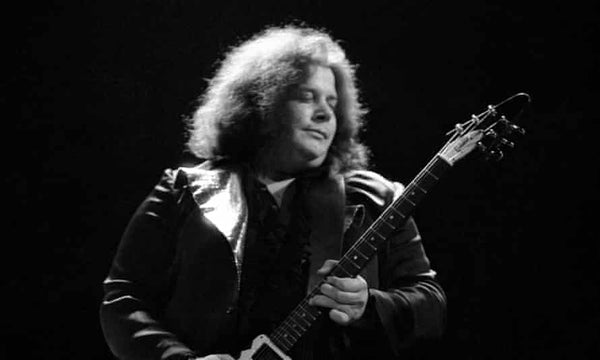The Man-Mountain was the name given to Gulliver by the Lilliputians and by his weight alone the name could also have been given to West himself. Was it coincidence that his first solo album and the band that followed were named Mountain? History does not relate but it did not stop him becoming a musician greatly respected by his peers. The physically huge West had a powerful presence as a singer, but it was his massive, overdriven guitar sound that became his most memorable trademark. According to Kiss’s Paul Stanley “Leslie’s tone could stop a rhino in full charge.”
Leslie West was born Leslie Weinstein in New York, on 22nd October 1945 and grew up in various locales - Hackensack, New Jersey, and the New York districts of East Meadow, Forest Hills and Lawrence. When his parents divorced, he abbreviated his surname to West, and grew up an overweight kid with a burning passion and considerable aptitude for playing guitar (the first instrument was purchased using the proceeds from his Bar Mitzvah).
His first band of note was The Vagrants, who debuted on disc with a single “Oh Those Eyes/ You’re Too Young”, which created only a few ripples beyond their Long Island fan base. One of their Unique Sales Points was their penchant for wrecking their gear onstage; the other was West’s stage garb – which included a huge feathered cape (the legendary concert promoter Bill Graham observed that it made West resemble a 300lb Psychedelic canary). The Vagrants then scored a deal with the (then primarily Folkie) Vanguard record label, which produced “I Can’t Make A Friend”, a fine slice of teen angst, but success was still not forthcoming. It was not long after that the band fell into the orbit of record producer/ musician Felix Pappalardi, who had worked with Cream, The Youngbloods, Joan Baez and others.
Pappalardi beat the drum loud and long on The Vagrants’ behalf, and succeeded in landing them a more substantial record deal with the Atco division of the Atlantic Records label. Their cover version of Otis Reddings’ “Respect” was a decent-size hit on the East Coast but by 1968, it was obvious that The Vagrants had gone as far as they could. At that time, Cream were just about the biggest and most influential band of their era and West was hugely impressed. Their shows became ever-more-intense improvisational workouts on Blues-Rock themes, where the lead guitar of Eric Clapton increasingly took centre-stage. Through his friendship with Pappalardi, West thought, perhaps, that here was a kind of musical blueprint that he could draw upon.
West’s first solo album, entitled Mountain, was released in 1969, and was produced by Pappalardi, peaking at a highly respectable eighty-two in the Billboard Album Chart listings in September 1969, and performing as the band Mountain, they were one of the acts who played at the epochal Woodstock Festival later that year (only their fourth gig).
The Mountain sound was as monolithic and huge as their name suggested; predicated around West’s ferocious roar of a voice, and his inventive Blues-Rock lead guitar, they extended the essential power trio template of Cream and the Jimi Hendrix Experience as Rock cleaved from mainstream pop, and Mountain would go on to become a huge international live draw. On record, the band enjoyed much success with tracks such as “Mississippi Queen”, a top thirty US singles chart hit in April 1970 and many of their album tracks became staples of American radio, including, of course, the dynamic, remorseless “Nantucket Sleighride”.
By mid-1972, however, the band had parted company with Pappalardi and West hooked up with Jack Bruce (formerly of Cream) and drummer Corky Laing in the ‘supergroup’, West, Bruce and Laing which produced two studio albums and a live effort. After briefly reforming Mountain, West resumed his solo career, fronting the Leslie West Band. For the album sessions, West called on Corky Laing, Gary Wright (late of Spooky Tooth, and a highly successful solo artist) on Keyboards, Don Kretmer on bass, and leavened his own gnarly vocal rasp with a female vocal foil in the shape of Diana Valery. They debuted on record in 1975, with the humorously-entitled The Great Fatsby, the first album in the package. The movie The Great Gatsby, starring Robert Redford and Mia Farrow, had been released in 1974, so West made the best use of a play on the title - indeed the cover features West dressed in a Jay Gatsby style white suit, outside what looks like a Rock Star Mansion, whilst he surveys an equally flashy limo.
Later in 1975, West would release the second album in the package, simply entitled Leslie West Band, in which he had added to the ranks a second guitarist in the shape of Brit Mick Jones – Jones had also played in a later version of Spooky Tooth, and was soon to convene the mega-successful Foreigner. After this album, an exhausted West had to divert his royalties to his grandfather in order to prevent him from blowing them on drugs. He admitted himself to a Milwaukee rehab clinic in 1976 and even stopped playing the guitar for two years.
In the 1980s, West would reform Mountain again, with Laing, but still busied himself with his solo career. The third album in the package, Theme, was released in 1988, followed by Alligator in 1989. The last album, Guitarded, was released in 2005. Although they don’t necessarily reach the vertiginous heights of yore, they’re still fine collections that will please lovers of fine guitar tone and bluesy hard rock.
Character is not something that you can annotate and transcribe. The late Leslie West was A Character. Loud, opinionated, often crude, often boorish, he was never dull. Looking back on the music he made, his lengthy career, and the immense regard that he is held in by his peers and successive generations of musicians, he did more than make his mark. You could love the guy, or hate him, but you could never ignore him.
With thanks to Alan Robinson

